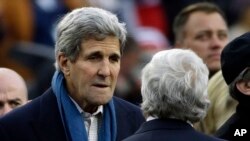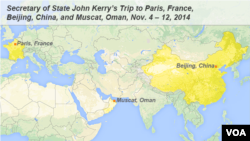U.S. Secretary of State John Kerry calls the U.S.-China relationship the most consequential in the world today.
Kerry, who leaves Tuesday for an overseas trip that includes a stop in Beijing, said in a speech Tuesday at the Johns Hopkins School of Advanced International Studies in Washington that ties between the two countries will do much to determine the shape of the 21st century.
As two of the world's major powers, Kerry said, the United States and China have a profound opportunity to build a constructive course on a number of issues, including clean energy, climate change, global trade, cyber security and the economic empowerment of women.
Kerry also praised Chinese help in combating nuclear proliferation by Iran and North Korea, but made clear that the U.S. will never "agree to disagree" with China on human rights, intellectual property infringement, and maritime security, add that disagreements will be put on the table, debated and narrowed over time.
"We've been clear about how strongly we object to any cyber-enabled theft of trade secrets and other sensitive information from our companies, whoever may be doing it, and we are convinced that it is in China's interest to help put an end to this practice," he said.
Ukraine, Iran, Ebola, Islamic State
Kerry’s first stop will be Paris, where he will sit down for talks with Foreign Minister Laurent Fabius on issues including Ukraine’s unrest, Ebola and the fight against Islamic State militants in Iraq and Syria.
The Atlantic Council’s Robert Manning says the talks about the Islamic State could lead to a push for an expansion of the U.S.-led coalition building efforts.
“I suspect there will be some pressure for greater European engagement," said Manning.
A senior State Department official says the Paris stop will also give Kerry an opportunity to discuss negotiations on Iran’s nuclear program with his French counterpart, before Kerry’s trilateral meeting with Iran’s Foreign Minister Javad Zarif and EU foreign policy chief Catherine Ashton in Oman.
At a Washington forum last week, Kerry said the ultimate goal is to shut off what he called Iran’s “pathways” to nuclear weapons.
“There are four present pathways to a bomb for Iran — the hidden, so-called 'secret' facility in a mountain called Fordow; the open Natanz enrichment facility; the plutonium heavy-water reactor called Arak; and then, of course, covert activities," said Kerry.
There has been scant progress on a nuclear deal with Iran. The so-called P5 Plus 1 want Iran to curb its ability to enrich uranium to keep it from building a nuclear bomb. In exchange, the U.N. would lift crippling economic sanctions against Iran.
The deadline for an agreement is November 24.
Iran insists its nuclear program is strictly for peaceful civilian purposes.
Kerry is also traveling to Beijing for an APEC (Asia Pacific Economic Cooperation) ministerial meeting, before a visit by President Barack Obama.
From Beijing, Kerry travels to Oman for the trilateral talks.





